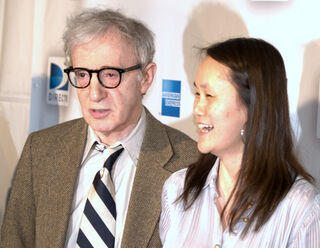Career
Woody Allen's "Apropos of Nothing"
Woody Pleads Not Guilty
Posted June 13, 2020 Reviewed by Hara Estroff Marano

Woody Allen’s new memoir, Apropos of Nothing, is the book that almost wasn’t published—his first publisher canceled it—and that many people say they don’t want to read.
Interestingly, having nearly been denied publication, much of this book consists of denials. Purporting to be about nothing, the book brims with information about everything, from Woody’s long, improbably successful life to his two sudden descents into tabloid news.
The first eruption began several decades ago when, late in his 13-year relationship with Mia Farrow, she discovered an affair between the then 54-year-old Woody and her 21-year-old adopted Korean daughter, Soon-Yi Previn. She retaliated by accusing him of sexually abusing the pair’s 7-year old adopted daughter, Dylan Farrow.
The second explosion burst into the dawn of the #Me Too era, attracting a new, bigger, and more believing audience, when Mia, the now-adult Dylan, and Mia and Woody's presumed biological son Satchel, renamed Ronan, reprised the child-abuse claims.
Apropos’ many small denials lead up to a resounding plea of Not Guilty! Woody Allen denies being guilty of everything of which he’s been accused, from nebbishy nerd to intellectual, genius filmmaker, talented musician, and child molester.
A life-long Woody Allen fan, I was eager to read his book. I was especially curious having covered, for this magazine, his 1992-3 custody trial with Mia over the couple's two adopted children: a teen-aged Korean boy, Moses Farrow, and Dylan, and Ronan.
Trial testimony absolved Woody of committing child abuse. Woody passed a lie detector test. He was also cleared in two lengthy investigations, by the New York State Child Welfare Department's police, and by Connecticut’s Yale-New Haven Child Abuse Clinic.
But a strongly pro-Mia judge, with no evidence, questioned the Yale-New Haven conclusions, leaving Woody's innocence in doubt.
I left the courtroom sympathizing with Mia. I admired the seeming compassion that led her, in addition to having her four biological children, to eventually adopt 11 needy, handicapped children from around the world. I also felt that Woody's affair with Mia's adopted daughter was morally queasy-making.
Several decades after publishing my Psychology Today article (“Of Human Bonding”) about the custody fight, I re-read the judge’s decision and decided I’d been wrong. I hadn’t realized that during the trial, and in the year or so afterwards, Mia had adopted five more needy tots, including a crack-addicted baby and and a blind girl from Vietnam.
I questioned how Mia, during this fraught time, could have mustered the concern and compassion to care for so many children. I could understand Mia’s continuing fury at Woody’s affair with Soon-Yi. But the relationship has lasted for more than twenty years. The couple has wed and even raised two seemingly well-adjusted, now college-age girls.
I belatedly found myself in Woody’s camp, and I’ve since posted several Psychology Today blog accounts about my new view of the case.
I began reading Apropos wondering whether Woody would change my mind again.
Thanks to several biographies, I was familiar with many details about his Brooklyn upbringing with his loving but quirky, quarrelsome parents and his large, colorful and doting relatives. I’d also read about his childhood, from his hatred of school, his love of—and escape into—films, to his improbable early success in high school as a gag writer for Broadway newspaper columnists, then progressing to comedy writer, to stand-up comic, to sometime playwright, to New Yorker writer and acclaimed filmmaker.
Woody doesn't deny his amazing achievements, but he downplays them. He attributes them to "hard work, some talent, much luck, major contributions from others." These "others" include at least a half-dozen Woody devotees, from his two agent/managers, Jack Rollins and Charles H. Joffe, who nurtured his career through its various iterations, to producer/United Artist and Orion Studio head Arthur Krim, who gave Woody total artistic cinematic control.
Woody's tone in his book is a reminder that he was first and always a writer. His voice, in recounting his early life and success, is breezy, engaging, often very entertaining. It swept me into his story, a fun and unputable-down read.
The book also offers a brief evaluation of his many films—at least 60 . And he describes aspects of filmmaking that he has found most pleasurable: writing; working with beautiful, gifted, and charismatic people; editing; and inserting some of his favorite music into his films.
Woody’s denials crop up early. He denies that in person he is anything like the nebbish he typically plays in his early films. He admits having grown up to be shy, gloomy, misanthropic, and a loner. But he writes that as a boy, he was very popular—athletic, excelling in track, baseball, and, later, tennis.
Despite life-long practice on his clarinet—and notwithstanding that his regular band performances here and in his European tours always sell out —Woody also denies having genuine musical talent.
In addition, he denies being the intellectual that much of his audience assume he is. He attributes this misperception to his big black horn-rimmed glasses, and to his knack for incorporating bits and pieces into his films from complex books or ideas whose actual meaning eludes him.
In a similar vein, Woody repeatedly denies being any sort of genius/auteur, which many of his fans have taken him to be. He notes that at work, he tries to leave his actors as free from direction as possible. He just starts to shoot, and hopes to finish as quickly as possible—preferably so he can get home in time for dinner.
Reluctantly, Woody admits that many of the filmmakers, playwrights, and other creative people he’s idolized—Ingmar Bergman, Tennessee Williams—have in turn admired him. But he denies that his cinematic output has come anywhere near the greatness of his idols’ work or even lived up to his own artistic vision.
End of Part One




